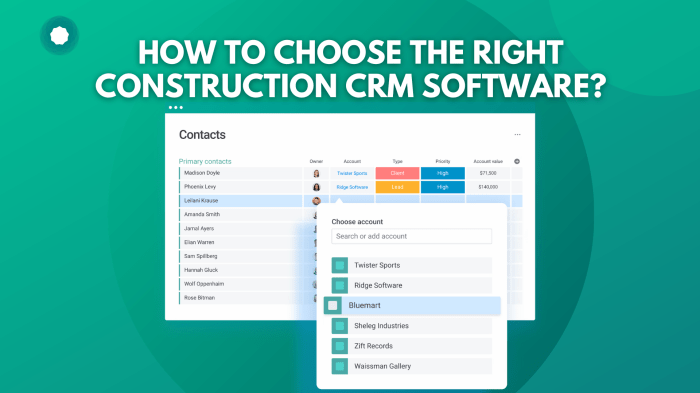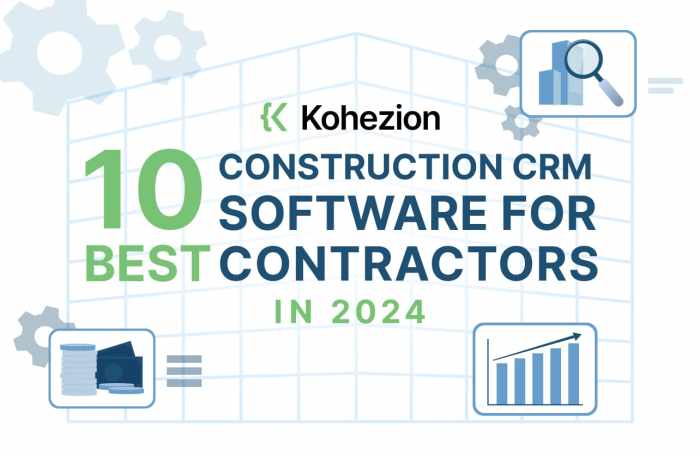CRM software for contractors is revolutionizing how construction and contracting businesses manage their operations. Efficiently tracking leads, managing projects, and maintaining client relationships are crucial for success in this competitive industry. Implementing a robust CRM system can significantly improve communication, boost productivity, and ultimately increase profitability. This allows contractors to focus on what truly matters: delivering exceptional results for their clients.
From small-scale renovations to large-scale construction projects, the right CRM software provides a centralized hub for all essential information. This includes client details, project timelines, budgets, and communication logs. This centralized approach eliminates the chaos of scattered spreadsheets and emails, creating a streamlined workflow that benefits both the contractor and their clients.
In the competitive landscape of the contracting industry, efficient project management and client relationship nurturing are paramount. This is where Customer Relationship Management (CRM) software steps in, offering a powerful solution to streamline operations and boost profitability. This comprehensive guide explores the benefits, features, and selection process for contractors seeking the ideal CRM solution, covering everything from lead generation to project completion and beyond.
We’ll delve into the nuances of choosing the right software, addressing specific needs and challenges faced by contractors of all sizes.
Why Contractors Need CRM Software
Contractors, whether specializing in construction, plumbing, electrical work, or other trades, often juggle multiple projects, clients, and subcontractors simultaneously. Without a robust system for managing these moving parts, inefficiencies creep in, impacting productivity and potentially damaging client relationships. A CRM specifically designed for contractors addresses these challenges by:
- Centralized Information: Consolidating all client data, project details, communication logs, and financial information in one easily accessible location.
- Improved Communication: Facilitating seamless communication with clients, subcontractors, and team members through integrated messaging, email, and scheduling features.
- Enhanced Project Management: Providing tools for task assignment, progress tracking, deadline management, and resource allocation, leading to better project organization and timely completion.
- Streamlined Lead Generation: Helping identify and qualify potential leads, track their progress through the sales funnel, and nurture them into paying clients.
- Increased Efficiency: Automating repetitive tasks such as invoicing, scheduling, and reporting, freeing up valuable time for focusing on core business activities.
- Better Client Relationships: Providing a personalized and responsive client experience, fostering loyalty and repeat business.
- Improved Reporting and Analytics: Offering insightful data on project performance, client engagement, and overall business health, enabling data-driven decision-making.
Key Features of Contractor-Specific CRM Software
While many CRM platforms exist, contractor-specific solutions offer features tailored to the unique needs of the industry. Look for software that includes:
Project Management Capabilities:
- Task Management: Assign tasks to team members, set deadlines, and track progress.
- Timeline Views: Visualize project timelines and identify potential bottlenecks.
- Document Management: Store and share project documents securely.
- Progress Reporting: Generate reports on project status and performance.
- Budget Tracking: Monitor project budgets and expenses.
Client Relationship Management Features:, Crm software for contractors
- Contact Management: Store and manage client contact information, communication history, and project details.
- Lead Management: Track leads from initial contact to conversion.
- Communication Tools: Integrate email, phone, and messaging capabilities for efficient communication.
- Customer Service Ticketing: Manage client inquiries and resolve issues promptly.
- Client Portals: Provide clients with access to project updates and documents.
Financial Management Tools:
- Invoicing: Generate and send invoices easily.
- Payment Processing: Accept payments online.
- Expense Tracking: Track project expenses and reconcile accounts.
- Reporting: Generate financial reports to track profitability and cash flow.
Other Important Considerations:
- Mobile Accessibility: Access the CRM from anywhere, anytime.
- Integrations: Integrate with other business tools, such as accounting software and scheduling apps.
- Customization: Tailor the CRM to your specific business needs.
- Scalability: Ensure the CRM can grow with your business.
- Customer Support: Choose a provider with excellent customer support.
Choosing the Right CRM Software for Your Contracting Business
Selecting the right CRM involves careful consideration of your specific needs and budget. Here’s a step-by-step guide:
- Assess your needs: Identify your key pain points and the features you need to address them.
- Research CRM options: Explore different CRM platforms and compare their features, pricing, and reviews.
- Request demos: Try out the software before committing to a purchase.
- Read reviews: See what other contractors say about their experiences with different CRMs.
- Consider your budget: Choose a CRM that fits your budget and offers good value for money.
- Check for integrations: Ensure the CRM integrates with your existing software.
- Evaluate customer support: Choose a provider with responsive and helpful customer support.
Popular CRM Software Options for Contractors
Several CRM platforms cater specifically to the contracting industry. Research and compare options like:
- HubSpot CRM: A popular, user-friendly option with a free plan and robust features.
- Zoho CRM: A comprehensive platform with a wide range of features and integrations.
- Salesforce: A powerful, scalable platform suitable for larger contracting businesses.
- JobNimbus: Specifically designed for field service businesses, including contractors.
- ServiceTitan: A comprehensive solution for home service businesses, often used by contractors.
Remember to thoroughly research each platform’s features and pricing before making a decision.

Source: cjpath.com
Choosing the right CRM software is crucial for any contractor to streamline operations and boost efficiency. This is especially true for specialized trades, such as roofing, where managing projects and client communication is paramount. For roofing contractors specifically, finding a solution that handles estimates, scheduling, and material tracking is key; consider exploring options like those found at crm software for roofing contractors.
Ultimately, selecting the appropriate CRM software benefits all contractors by improving overall business management.
Frequently Asked Questions (FAQ): Crm Software For Contractors
- Q: How much does CRM software for contractors cost? A: Pricing varies greatly depending on the platform, features, and number of users. Some offer free plans, while others charge monthly or annual subscriptions, ranging from a few hundred to several thousand dollars.
- Q: Is CRM software difficult to learn? A: Most modern CRM platforms are designed with user-friendliness in mind. Many offer tutorials and support to help users get started.
- Q: Can CRM software integrate with my existing accounting software? A: Many CRM platforms offer integrations with popular accounting software packages. Check the platform’s specifications to ensure compatibility.
- Q: How long does it take to implement CRM software? A: Implementation time varies depending on the complexity of the software and your business needs. It can range from a few days to several weeks.
- Q: What are the benefits of using a mobile CRM app? A: Mobile access allows contractors to manage projects, communicate with clients, and access information from anywhere, anytime, increasing efficiency and responsiveness.
- Q: Can CRM software help improve client satisfaction? A: Yes, by improving communication, project management, and overall client experience, CRM software can significantly boost client satisfaction and loyalty.
Conclusion
Implementing a CRM system is a strategic investment for any contracting business looking to improve efficiency, enhance client relationships, and drive profitability. By carefully considering your specific needs and exploring the various options available, you can find the perfect CRM solution to streamline your operations and take your contracting business to the next level.
Call to Action
Ready to transform your contracting business? Explore the CRM options mentioned above and schedule a demo today! Start leveraging the power of CRM to achieve greater success.
In conclusion, adopting CRM software is a strategic move for contractors seeking to optimize their business processes and enhance client relationships. By centralizing information, improving communication, and streamlining workflows, contractors can experience increased efficiency, reduced administrative burden, and ultimately, greater success. The benefits extend beyond simple organization; a well-implemented CRM system empowers contractors to focus on strategic growth and delivering exceptional service, building lasting relationships with their clients and securing future projects.
FAQs
What are the key features to look for in CRM software for contractors?
Essential features include project management tools, contact management, lead tracking, reporting and analytics, and ideally, mobile accessibility.
How much does CRM software for contractors typically cost?
Pricing varies widely depending on the features, scale, and provider. Options range from affordable monthly subscriptions to more enterprise-level solutions with higher costs.

Source: kohezion.com
How long does it take to implement CRM software?
Implementation time depends on the complexity of the software and the size of the business. Smaller businesses might see results quickly, while larger firms may require more time for data migration and training.
Can CRM software integrate with other business tools?
Many CRM systems offer integrations with accounting software, scheduling tools, and other applications to create a unified workflow.
